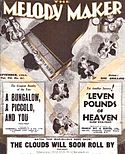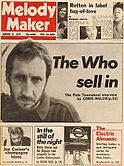- Melody Maker
-
Melody Maker 
Frequency Monthly First issue July 1926 Final issue December 2000 Company IPCC Country  United Kingdom
United KingdomBased in London, England Language English Melody Maker, published in the United Kingdom, was, according to its publisher IPC Media, the world's oldest weekly music newspaper.[1] It was founded in 1926 as a magazine targeted at musicians; in 2000 it was merged into "long-standing rival"[1] (and IPC Media sister publication) New Musical Express.
Contents
1950s–1960s
Originally the Melody Maker (MM) concentrated on jazz, and had Max Jones, one of the leading British proselytizers for that music, on its staff for many years. It was slow to cover rock and roll and lost ground to the New Musical Express (NME), which had begun in 1952. MM began its Melody Maker LP charts in November 1958, two years after the Record Mirror published the first UK Albums Chart.[2]
On 6 March 1965, MM called for The Beatles to be honoured by the British state, which happened on 12 June that year when all four were made MBEs.
By the late 1960s, MM had recovered momentum, targeting an older market than the teen-oriented NME. MM had larger and more specialised advertising; soon-to-be well-known groups would advertise for musicians. It ran pages devoted to "minority" interests like folk and jazz, as well as detailed reviews of musical instruments.
A 1968 Melody Maker poll named John Peel best radio DJ, attention which John Walters revealed may have helped Peel keep his job despite concerns at BBC Radio 1 about Peel's style and record selection.[3]
1970s
Melody Maker covers 1932 - 2000 Critics such as Richard Williams, Michael Watts, Chris Welch and Steve Lake were among the first British journalists to write seriously about popular music, shedding an intellectual light on such artists as Steely Dan, Cat Stevens, Led Zeppelin and Henry Cow.
Melody Maker supported glam rock and progressive rock in the 1970s.
In 1978, Richard Williams returned again as editor attempting to take MM in a new direction influenced by what Paul Morley and Ian Penman were doing at NME and with Jon Savage, Chris Bohn and Mary Harron providing arty coverage of post-punk and New Wave while Vivien Goldman who was previously at NME and Sounds, gave the paper much improved coverage of reggae and soul music, an area in which it had fallen short of its competitors.
Internal tension came to light, principally between Williams and Ray Coleman, by this time editor-in-chief, who wanted the paper to stick to the more "conservative rock" music it had continued to support during the punk era. Coleman had been insistent that the paper should "look like The Daily Telegraph" (renowned for its old-fashioned design), but Williams wanted the paper to look more contemporary. He commissioned an updated design, but this was rejected by Coleman.
It was during this period that Melody Maker was described as "the musos' journal," and that Michael "Mick" Watts emerged as a prominent writer for the paper.[4] In January 1972, in a defining moment for rock journalism, Watts interviewed David Bowie on the German film set of Just A Gigolo for Melody Maker.[5] It was during this interview that Bowie claimed, "I'm gay, and always have been, even when I was David Jones."[6] "OH YOU PRETTY THING" ran the headline, and swiftly became part of pop mythology. Bowie later attributed his success to this interview, stating that, "Yeah, it was Melody Maker that made me. It was that piece by Mick Watts."[7] During his tenure at the paper, Watts also interviewed artists including Syd Barrett, Waylon Jennings, Pink Floyd, and Bruce Springsteen.
1980s
In 1980, after a strike which had taken the paper (along with NME) out of publication for a period, Williams left MM. Coleman promoted Michael Oldfield from the design staff to day-to-day editor, and, for a while, took it back where it had been, with news of a line-up change in Jethro Tull replacing features about Andy Warhol, Gang of Four and Factory Records on the cover. Several journalists, such as Chris Bohn and Vivien Goldman, moved to NME, while Jon Savage joined the new magazine The Face. Coleman left in 1981, the paper's design was updated, but sales and prestige were at a low ebb through the early 1980s, with NME dominant.
By 1983, the magazine had become more populist and pop-orientated, exemplified by its modish "MM" masthead, regular covers for the likes of Duran Duran and its choice of Eurythmics' Touch as the best album of the year. Things were to change, however. In February 1984, Allan Jones and a staff writer on the paper since 1974, was appointed editor: defying instructions to put Kajagoogoo on the cover, he led the magazine with an article on up-and-coming band The Smiths.
In 1986, MM was invigorated by the arrival of a group of journalists, including Simon Reynolds and David Stubbs, who had run a music fanzine called Monitor from the University of Oxford, and Chris Roberts, from Sounds, who established MM as more individualistic and intellectual. This was especially true after the hip-hop wars at NME, a schism between enthusiasts of progressive black music such as Public Enemy and Mantronix and fans of traditional white rock - ended in a victory for the latter, the departure of writers such as Mark Sinker and Biba Kopf, and the rise of Andrew Collins and Stuart Maconie, who pushed NME in a more populist direction.
1990s
While MM continued to devote most space to rock and indie music (notably Everett True's coverage of the emerging grunge scene in Seattle), it covered dance music, hip hop and post rock and electronica. Two of the paper's writers, Push and Ben Turner, went on to launch IPC Media's monthly dance music magazine Muzik. Even in the mid-1990s, when Britpop brought a new generation of readers to the music press, it remained less populist than its rivals, with younger writers such as Simon Price, Taylor Parkes and Neil Kulkarni continuing the 1980s tradition of iconoclasm and opinionated criticism. The paper printed harsh criticism of Ocean Colour Scene and Kula Shaker, and allowed dissenting views on Oasis and Blur at a time when they were praised by the rest of the press.
The magazine retained its large classified ads section, and remained the first call for musicians wanting to form a band. Suede formed through ads placed in the paper. MM also continued to publish reviews of musical equipment and readers' demo tapes - though these often had little in common stylistically with the rest of the paper - ensuring sales to jobbing musicians who would otherwise have little interest in the music press.
In early 1997, Allan Jones left to edit Uncut. He was replaced, somewhat controversially,[citation needed] by Mark Sutherland, formerly of NME and Smash Hits, who "fulfilled his boyhood dream"[8] by editing the magazine for three years. Many long-standing writers left, often moving to Uncut, with at least one writer, Simon Price, departing because he objected to an edict that coverage of Oasis should be positive. Its sales, which had been substantially lower than those of the NME, entered a serious decline.
In 1999, MM relaunched as a glossy magazine, but the new design did not help. The magazine closed the next year and merged with IPC Media's other music magazine, NME, which took on some of its journalists and music reviewers.
Bands using MM adverts
Advertisements in Melody Maker helped assemble the lineups of a number of major bands, including:
- Jet Black met Hugh Cornwell (then of the band Johnny Sox) after reading an advertisement in Melody Maker magazine. Cornwell joined Black in The Stranglers in 1974.
- Bill Bruford placed an ad in 1968 that was answered by Jon Anderson and Chris Squire to form the founding lineup of Yes.[9]
- Rick Davies, backed financially by Dutch millionaire Stanley August Miesegaes, formed Supertramp, the "band of his dreams" in 1969.[10]
- Deep Purple found the then-unknown David Coverdale in 1973.[11]
- Depeche Mode placed an ad in 1981 and found Alan Wilder.[12]
- Vince Clarke of Erasure found Andy Bell in 1985.[13]
- The original members of Suede recruited guitarist Bernard Butler in 1989.[14]
- Steve Hackett of Genesis put an ad in MM that was answered by the band frontman Peter Gabriel in 1970.[15]
- Wang Chung got its start when Jack Hues met Nick Feldman after answering Feldman's ad for a musician in 1977.[16]
- Noel Redding, the bassist of The Jimi Hendrix Experience, auditioned for The Animals after responding to an ad. Eventually the bassist of The Animals, Chas Chandler, introduced him to Jimi Hendrix.[citation needed]
- Limahl teamed up with band 'Art Nouveau' and formed Kajagoogoo from an advert he placed in MM.[17]
References
- ^ a b Melody Maker to merge with NME, a December 2000 BBC article
- ^ The Album Chart (1950s) from the BBC Radio 2 website
- ^ John Peel Day 2005 from the BBC Radio 1 website
- ^ "Interview: Out of His Pen: The Words of Richard Williams". Out Of His Pen. 2002. http://rockcriticsarchives.com/interviews/richardwilliams/01.html. Retrieved 5 July 2011.
- ^ "Interview: David Bowie". Bowie: A Biography. January 1972. http://books.google.com/books?id=JrvOjdqP1GAC&pg=PA180&lpg=PA180&dq=%22i'm+gay%22+bowie+watts&source=bl&ots=5zN4BNT2sZ&sig=UClN0YlMBzx6U2QWXZS2uZvRs28&hl=en&ei=L6gTTuDFIM3XiAKAvKDKAw&sa=X&oi=book_result&ct=result&resnum=6&ved=0CDUQ6AEwBQ#v=onepage&q=%22i'm%20gay%22%20bowie%20watts&f=false. Retrieved 5 July 2011.
- ^ "Interview: David Bowie". Macho Man. September 1976. http://books.google.com/books?id=7S0OOeKFR3gC&pg=PA56&lpg=PA56&dq=%22mick+watts%22+%22david+jones%22&source=bl&ots=HGL96jEbWr&sig=5RpiAR6VJdYG17jID8PwnAX5LS8&hl=en&ei=6KkTTuDBJMrXiAKpmeHDAg&sa=X&oi=book_result&ct=result&resnum=1&ved=0CBUQ6AEwAA#v=onepage&q=%22mick%20watts%22%20%22david%20jones%22&f=false. Retrieved 5 July 2010.
- ^ "Interview: Cha...cha...cha...changes: A journey with Aladdin". Melody Maker. 12 May 1973. http://www.5years.com/mm12may73.htm. Retrieved 5 July 2011.
- ^ Mark Sutherland's Biography from the BBC 6 Music website
- ^ Bill Bruford's official website
- ^ Supertramp from Stuart Maconie's Critical List on the BBC Radio 2 website
- ^ David Coverdale from the BBC website
- ^ Recoil's official website
- ^ 2003 Interview with Erasure from the BBC website
- ^ Seven Ages of Rock: Suede from the BBC Radio 2 website
- ^ [1] from Steve Hackett's official site
- ^ [2] from Wang Chung's official site
- ^ http://www.kajagoogoo.com/history/history_01.html Kajagoogoo Official Website
Categories:- Melody Maker writers
- British music magazines
- Publications established in 1926
- Publications disestablished in 2000
- Defunct weekly newspapers
- Defunct newspapers of the United Kingdom
- 1926 establishments in the United Kingdom
Wikimedia Foundation. 2010.






